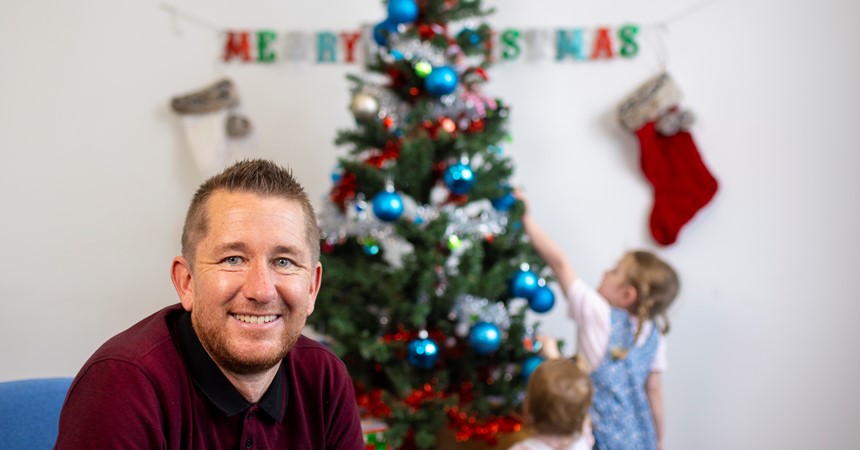Not having a family to spend time with, no fancy lunch or opening presents around the tree.
That’s going to be a sad reality for far too many children and young people across NSW this year.
Currently, there are almost 500 children and young people, including more than 35 across the Hunter and Central Coast**, living in emergency or temporary care placements while they wait for a place to call home.
It’s children like 13-year-old James*, 10-year-old Lara*, and sibling trio Sam* (three), Riley* (two) and Benjamin* (one).
James is living in a motel, Lara is in a group home scenario and the loveable brothers have been separated and are living with short-term emergency placement carers.
What they’re wishing for this Christmas is a family.
“There is an overwhelming shortage of carers in our region, and it is devastating to think that a number of children and young people will be struggling this Christmas,” CatholicCare Social Services Hunter-Manning Team Leader Michael Jordan said.
“What they need is a safe place to call home. So, if you have room for one more, please consider becoming a foster carer,” he said.
As a carer himself, he knows how vitally important the job is.
“Fosters carers play such a pivotal role in the lives of young people – they are carers, nurturers and teachers,” he said.
“It can be challenging, but it is also the most rewarding experience.
“Seeing a young person smile and knowing that you have played a role in that is the best thing.”
Upper Hunter local Hannah* is a testament to the positive difference foster care can make in a young person’s life.
When she was born, Hannah was placed into foster care because her parents struggled with intellectual disability and were unable to look after her.
“I had some family members put up their hands and I went on and stayed at a few different places until I settled at my Auntie Edith and Uncle Rob’s house,” she said.
“Then I stayed there until I was 18 and just became part of their family.”
While Hannah was lucky enough to stay with her relatives, she still faced many challenges around her identity and sense of belonging.
“It's a really hard space to grow up in because on one hand you've been welcomed into this new family but then on the other hand, you know that there's another family that you technically belong to as well,” she explained.
“Add that to the stigma around kids in care and it takes time to figure out who you are.”
She encourages all children and young people who find themselves in a similar situation to be themselves.
“Just be who you are and find a support person who is going to care about you – somebody who will be there for you in your life, who will stick up for you and have your back,” Hannah said.
Carers have the power to make a positive difference for a child or young person who is struggling.
“Carers can help kids develop into good, happy and healthy human beings,” Hannah said.
That is why her heart breaks when she hears of children and young people living in motels or other emergency placements.
“It's just really sad that there’s not a placement out there for them,” she said.
“A lot of kids would be thinking that nobody wants them, or nobody wants to help them other than people who are paid.”
Hannah would like people to know the attributes needed to become a foster carer are simple.
“If you are genuine about helping young people, you’ve got a big heart and are generous with your time, you should become a carer.”
Today we are asking you to think about what you can do for children and young people in need.
“We need more carers to help these children and young people find their place in society and grow into the best version of themselves,” Hannah said.
If not you, than who?
For more information about fostering with CatholicCare, please visit fostercare.catholiccare.org.au or contact our friendly team on 1300 590 898.
We welcome carers from all walks of life, regardless of religion, gender, ethnicity, or disability.
*To protect the identity of children in care their names have been changed.
**Accurate at the time of writing in October 2023.
Types of Foster Care
Immediate care: Also known as crisis care, this type of short-term care is provided to children or young people who need an urgent place to stay because there are concerns for their imminent safety.
Respite care: This is short-term care provided to children or young people with the intention of giving their regular carers a reprieve from caring duties.
Short/medium term: This type of care can last anywhere from a few months to two years, and usually takes place while restoration with the child’s family is being explored.
Long-term care: This type of care is more permanent, lasting longer than two years, and usually when restoration with the family is not possible. When a child or young person is on a long-term care permanency pathway other permanency goals can be explored such as restoration, guardianship or adoption.
Relative/kinship care: This is when a child or young person lives with other family members or someone they already know, such as a grandmother or family friend. This is the preferred option when it is in the child or young person’s best interest, and where the child or young person is unable to be restored to their parents.
Follow mnnews.today on Facebook.



























































































